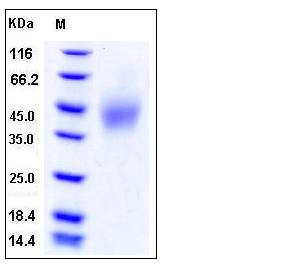Mouse SLAMF6 / Ly108 Protein (His Tag)
KAL1,KAL1b,Ly108,NTB-A,NTBA,SF2000
- 100ug (NPP2741) Please inquiry
| Catalog Number | P50275-M08H |
|---|---|
| Organism Species | Mouse |
| Host | Human Cells |
| Synonyms | KAL1,KAL1b,Ly108,NTB-A,NTBA,SF2000 |
| Molecular Weight | The recombinant mouse SLAMF6 consists of 220 amino acids and has a predicted molecular mass of 24.4 kD. The apparent molecular mass of the rmSLAMF6 protein is approximately 40-45 kDa in SDS-PAGE under reducing conditions. |
| predicted N | Glu 31 |
| SDS-PAGE |  |
| Purity | > 95 % as determined by SDS-PAGE |
| Protein Construction | A DNA sequence encoding the mouse SLAMF6 (NP_109635.1) extracellular domain (Met 1-Asn 239) was fused with a polyhistidine tag at the C-terminus. |
| Bio-activity | Measured by its ability to bind biotinylated recombinant human SH2D1A in a functional ELISA. |
| Research Area | Immunology |Signal Transduction |ITIM/ITAM Immunoreceptors and Related Molecules |
| Formulation | Lyophilized from sterile PBS, pH 7.4 1. Normally 5 % - 8 % trehalose and mannitol are added as protectants before lyophilization. Specific concentrations are included in the hardcopy of COA. |
| Background | SLAM family member 6, also known as Activating NK receptor, NK-T-B-antigen, NTB-A, SLAMF6, KALI and Ly108, is a single-pass type I membrane protein which belongs to the CD2 subfamily of the immunoglobulin superfamily. SLAMF6 / Ly108 contains one Ig-like (immunoglobulin-like) domain. It is expressed by all (resting and activated) natural killer cells (NK), T- and B-lymphocytes. SLAMF6 / Ly108 triggers cytolytic activity only in natural killer cells (NK) expressing high surface densities of natural cytotoxicity receptors. SLAMF6 / Ly108 is a homodimer. It interacts with PTN6 and, upon phosphorylation, with PTN11 and SH2D1A/SAP. SLAMF6 / Ly108 undergoes tyrosine phosphorylation and associates with the Src homology 2 domain-containing protein (SH2D1A) as well as with SH2 domain-containing phosphatases (SHPs). It may function as a coreceptor in the process of NK cell activation. SLAMF6 / Ly108 can also mediate inhibitory signals in NK cells from X-linked lymphoproliferative patients. |
| Reference |
